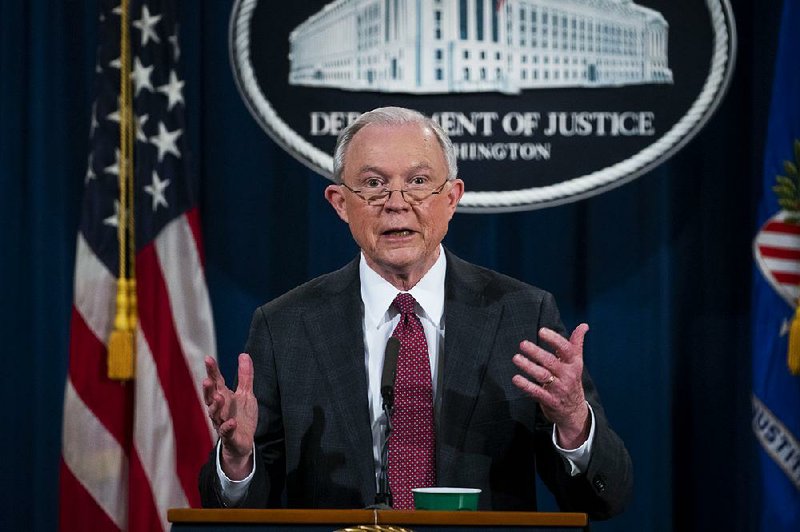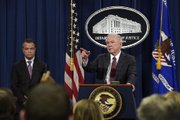WASHINGTON -- Attorney General Jeff Sessions, facing a chorus of criticism over his contacts with the Russian ambassador, recused himself Thursday from any current or future investigation of Russian meddling in the 2016 presidential election.
Calls for his recusal came after the disclosure Wednesday that Sessions spoke with the Russian ambassador last year, apparently contradicting his testimony at his confirmation hearing. His conversations with the ambassador, Sergey Kislyak, came amid suspected Russian hacking directed at Democrat Hillary Clinton's campaign.
Sessions said he made the decision to recuse after meeting with senior career officials at the Justice Department. He said he would not take part in any investigations "related in any way to the campaigns for president of the United States."
He also strongly denied that any of his conversations with Russian officials were related to the presidential campaign. And Sessions rejected any suggestion that he had tried to mislead anyone about his contacts with the Russian, saying, "That is not my intent. That is not correct."
[PRESIDENT TRUMP: Timeline, appointments, executive orders + guide to actions in first 100 days]
But he did allow that he should have been more careful in his testimony during his confirmation hearing, saying, "I should have slowed down and said, 'But I did meet one Russian official a couple of times.'"
The remarks by Sessions came not long after President Donald Trump on Thursday expressed his support for Sessions and said he should not recuse himself from the investigation. Sessions was a key adviser and surrogate for Trump's campaign.
Touring the USS Gerald R. Ford, the newest U.S. aircraft carrier, in Newport News, Va., Trump said that he "wasn't aware" that Sessions had spoken to the ambassador but that he believed that the attorney general had testified truthfully to the Senate during his confirmation hearing.
"I think he probably did," Trump told reporters.
Asked whether Sessions should recuse himself in the Russia investigations, the president said, "I don't think so."
Now that Sessions has recused himself, Acting Deputy Attorney General Dana Boente will handle such matters.
Contacts with Russian officials have become a persistent distraction for the Trump administration. Trump's national security adviser, Michael Flynn, was forced to resign over his conflicting statements about conversations with Kislyak. Sessions was forced to use his first news conference as attorney general to address questions about his impartiality.
Breaking ranks
Overnight, congressional Republicans began breaking ranks to join Democrats in demanding that Sessions recuse himself from overseeing a probe into contacts between the Trump campaign and the Russian government.
The partisan furor that broke out with the Justice Department's acknowledgment of the contacts late Wednesday began to take on a bipartisan sheen as the dispute spilled into Thursday morning.
Rep. Jason Chaffetz, R-Utah, who leads the Oversight Committee, said Thursday on Twitter, "AG Sessions should clarify his testimony and recuse himself."
Sen. Rob Portman, R-Ohio, said in a statement, "Jeff Sessions is a former colleague and a friend, but I think it would be best for him and for the country to recuse himself from the DOJ Russia probe."
Some Democrats were already going further, suggesting that Sessions had perjured himself in the confirmation hearing for the attorney general post and demanding that he step down.
"For the good of the country, Attorney General Jeff Sessions should resign," said Senate Democratic leader Charles Schumer of New York.
House Democratic leader Nancy Pelosi of California took the same position, as did Democratic National Committee Chairman Tom Perez.
Democrats on the House Judiciary Committee sent a letter Thursday to the Justice Department and the FBI asking for "an immediate criminal investigation into these statements, which could potentially implicate a number of criminal laws including lying to Congress and perjury."
The Trump administration dismissed the accusations as partisan attacks, and Sessions said in a statement issued shortly before midnight that he had not addressed election matters with Kislyak.
"I never met with any Russian officials to discuss issues of the campaign," Sessions said in the statement. "I have no idea what this allegation is about. It is false."
In an appearance on NBC News on Thursday morning, Sessions reiterated that he had not met with the Russian ambassador to discuss the political campaign, but left the door open to stepping aside from the investigation.
"I have said whenever it's appropriate, I will recuse myself," he said. "There's no doubt about that."
At the confirmation hearing for attorney general in January, Sen. Al Franken, D-Minn., asked Sessions about a CNN report that intelligence briefers had told then-president Barack Obama and then-president-elect Trump that Russian operatives claimed to have compromising information about Trump.
Franken also noted that the report indicated that surrogates for Trump and intermediaries for the Russian government continued to exchange information during the campaign. He asked Sessions what he would do if that report proved true.
Sessions replied that he was "not aware of any of those activities." He added, "I have been called a surrogate at a time or two in that campaign, and I didn't have -- did not have communications with the Russians, and I'm unable to comment on it."
But the Justice Department acknowledged Wednesday that Sessions had twice communicated with the Russian ambassador last year. The first time was in July, at the Republican National Convention, after he gave a speech at an event for ambassadors sponsored by the Heritage Foundation. The second time was a visit to his office by Kislyak in September. The Washington Post earlier reported both encounters.
A spokesman for the Justice Department, Sarah Isgur Flores, said "there was absolutely nothing misleading" about Sessions' answers at his confirmation hearing. She said Sessions, as a senior member of the Senate Armed Services Committee, had at least 25 conversations with foreign ambassadors, including those from Australia, Britain, Canada, China, Germany, India, Japan, Korea, Poland and Russia.
She added, "He was asked during the hearing about communications between Russia and the Trump campaign -- not about meetings he took as a senator and a member of the Armed Services Committee."
In Russia, President Vladimir Putin's spokesman Dmitry Peskov told reporters Thursday that he did not know anything about the meetings last year between Kislyak and Sessions.
Peskov said it was normal for an ambassador to meet with officials and lawmakers, adding that "the more such meetings an ambassador has, the more efficient his work is."
Kushner, Flynn
Separately Thursday, the White House confirmed that Flynn, while the incoming national security adviser, had a previously undisclosed meeting with the Russian ambassador in December to "establish a line of communication" between the new administration and the Russian government.
Jared Kushner, Trump's son-in-law and a senior adviser, also participated in the meeting at Trump Tower with Flynn and Kislyak. But among Trump's inner circle, it is Flynn who appears to have been the main interlocutor with the Russian envoy -- the two were in contact during the campaign and the transition, Kislyak and current and former U.S. officials have said.
The New Yorker reported this week that Kushner had met with Kislyak at Trump Tower in December. Hope Hicks, a White House spokesman, confirmed Thursday in response to questions from a New York Times reporter that Flynn was also at the meeting.
The meeting in December came just as the Obama White House was preparing to sanction Russia and publicly make its case that Moscow had interfered with the 2016 election.
It is common and not improper for transition officials to meet with foreign officials. But all meetings between Trump associates and Russians are under extra scrutiny as the FBI investigates Russian interference in the U.S. election and whether anyone close to Trump's campaign was involved.
"They generally discussed the relationship and it made sense to establish a line of communication," Hicks said of the meeting. "Jared has had meetings with many other foreign countries and representatives -- as many as two dozen other foreign countries' leaders and representatives."
The meeting at Trump Tower lasted 20 minutes, and Kushner has not met since with Kislyak, Hicks said.
Information for this article was contributed by Eric Lichtblau, Michael D. Shear, Charlie Savage, Michael S. Schmidt, Matthew Rosenberg and Matt Apuzzo of The New York Times; by Erick Tucker, Julie Pace, Richard Lardner, Mary Clare Jalonick, Andrew Taylor, Stephen Ohlemacher and Vladimir Isachenkov of The Associated Press; and by Chris Strohm, Justin Sink and Jennifer Jacobs of Bloomberg News.
A Section on 03/03/2017

